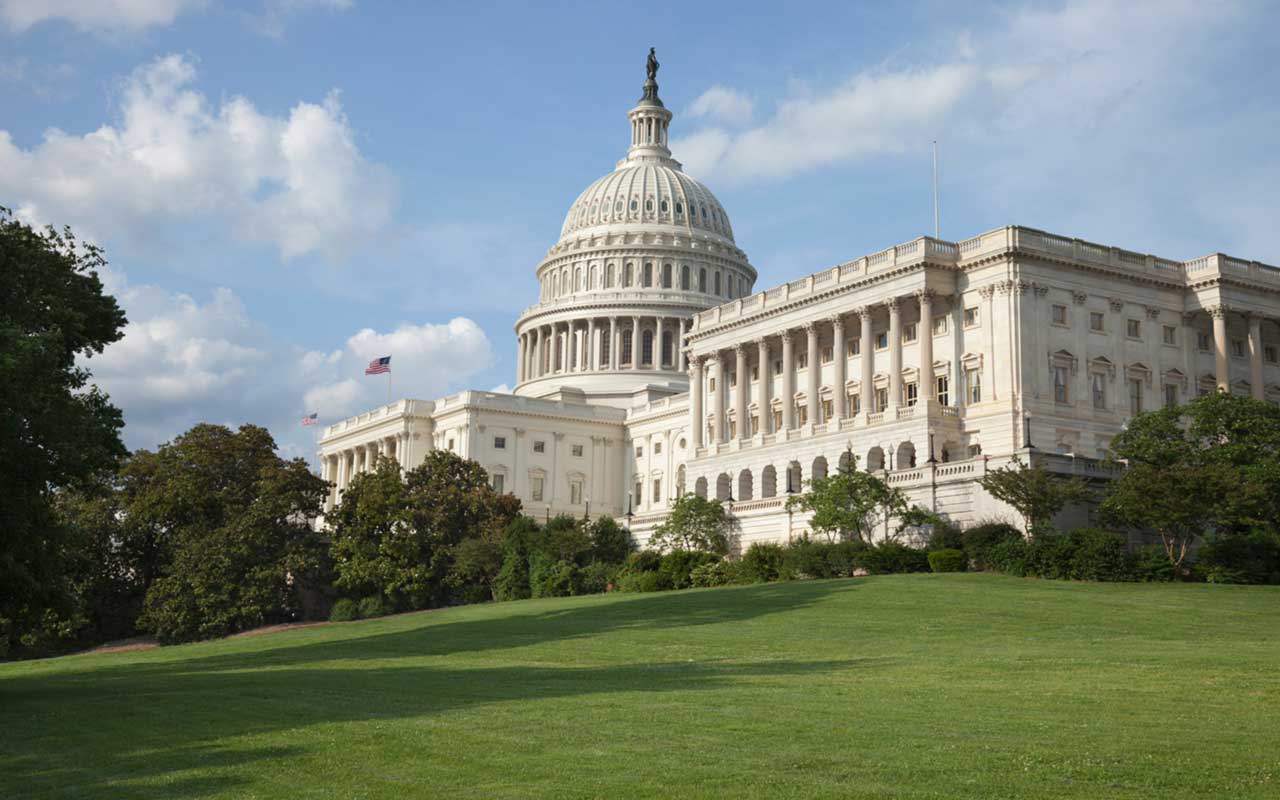5 HEROES Act Provisions with a Good Chance of Becoming Law
The massive federal stimulus bill just passed by the House of Representatives is "dead on arrival" in the Senate. But a few proposals in the bill have enough bipartisan support to eventually become law.


Profit and prosper with the best of Kiplinger's advice on investing, taxes, retirement, personal finance and much more. Delivered daily. Enter your email in the box and click Sign Me Up.
You are now subscribed
Your newsletter sign-up was successful
Want to add more newsletters?

Delivered daily
Kiplinger Today
Profit and prosper with the best of Kiplinger's advice on investing, taxes, retirement, personal finance and much more delivered daily. Smart money moves start here.

Sent five days a week
Kiplinger A Step Ahead
Get practical help to make better financial decisions in your everyday life, from spending to savings on top deals.

Delivered daily
Kiplinger Closing Bell
Get today's biggest financial and investing headlines delivered to your inbox every day the U.S. stock market is open.

Sent twice a week
Kiplinger Adviser Intel
Financial pros across the country share best practices and fresh tactics to preserve and grow your wealth.

Delivered weekly
Kiplinger Tax Tips
Trim your federal and state tax bills with practical tax-planning and tax-cutting strategies.

Sent twice a week
Kiplinger Retirement Tips
Your twice-a-week guide to planning and enjoying a financially secure and richly rewarding retirement

Sent bimonthly.
Kiplinger Adviser Angle
Insights for advisers, wealth managers and other financial professionals.

Sent twice a week
Kiplinger Investing Weekly
Your twice-a-week roundup of promising stocks, funds, companies and industries you should consider, ones you should avoid, and why.

Sent weekly for six weeks
Kiplinger Invest for Retirement
Your step-by-step six-part series on how to invest for retirement, from devising a successful strategy to exactly which investments to choose.
Oh well, it was nice while it lasted. Even though there were tough negotiations, Republicans and Democrats in Washington were able to quickly pass the first few coronavirus economic stimulus bills. But now it looks like hyper partisanship reigns supreme once again in the nation's capital. For evidence of this, look no further than the most recent stimulus package being kicked around in Congress — the Health and Economic Recovery Omnibus Emergency Solutions (HEROES) Act. Democrats just pushed the massive, $3 trillion bill through the House of Representatives. But President Trump and Republican lawmakers have declared it "dead on arrival" in the Senate. It seems as if the two sides couldn't be further apart.
But there's a glimmer of hope. There are enough lawmakers on both sides of the aisle who believe Americans need more help. So, while the HEROES Act as it exists right now is destined to go nowhere, it's likely that another stimulus package of some sort will eventually get through Congress and be signed into law by the president. Are there any provisions in the current HEROES Act that could be included in the next law? You bet! Here are five HEROES Act proposals with a good chance of ultimately becoming law.

A Second Round of Stimulus Checks
The HEROES Act calls for a second round of stimulus checks to most Americans. The plan is to provide a $1,200 base payment to each eligible person ($2,400 for married couples filing a joint return), plus an additional $1,200 for each dependent (up to a maximum of three dependents). So, for example, a married couple with three children could get up to $6,000. As with the first round of stimulus checks, the HEROES Act stimulus payments would be phased-out for people with higher incomes. (For a comparison of the first round of stimulus checks and the second round as proposed in the HEROES Act, see How a Second Stimulus Check Could Differ from Your First One.)
President Trump has expressed interest in a second round of stimulus checks. That certainly improves the chances of an additional round. Plus, while Senate majority leader Mitch McConnell (R-Ky.) wants to wait before passing any additional stimulus legislation, he hasn't publicly closed the door on the idea, either. Several other Republican Senators aren't necessarily enthusiastic about another second round of stimulus checks right now, but many of them seem open to the idea if they are needed later.
Republicans certainly aren't likely to support a stimulus check program that is too costly (like the proposal to send $2,000 monthly checks until the pandemic is over). However, as long as payment amounts aren't too high, eligibility isn't too broad, and the duration is limited, the odds of seeing a second round of stimulus checks are good.

Improvements to the Employee Retention Credit
The CARES Act, an earlier economic stimulus law enacted in March 2020, created a new payroll tax credit for businesses impacted by the coronavirus pandemic that continue to employ their workers. It's called the employee retention credit, and both Democrats and Republicans are interested in making it better.
The credit can be worth up to $5,000 per paid employee (50% of up to $10,000 in qualified wages). However, it only applies to qualified wages paid from March 13 through December 31, 2020. What is considered "qualified wages" depends on the number of employees the business had in 2019. If a company averaged more than 100 full-time employees, qualifying wages are only those paid when an employee is not working due to (1) a full or partial suspension of the employer's business operations by a governmental order, or (2) the business experiencing a significant decline in gross receipts. For smaller firms, all wages paid when business operations are suspended, or the business is experiencing a significant decline in gross receipts, are eligible for the credit.
The HEROES Act offers several improvements to the credit. For instance, it would bump the maximum credit amount from $5,000 to $36,000 per paid worker. The bill would also change the 100-employee rule for determining qualified wages for large employers. Under the HEROES Act, only a company with more than 1,500 full-time employees and gross receipts greater than $41.5 million in 2019 would be treated as a large employer. Among other things, the bill would also extend the credit to eligible state and local government employers and allow businesses that take out Paycheck Protection Program loans to qualify for the credit.
There's bipartisan support for these or similar changes. Regarding the credit, Rep. Kevin Brady (R-Tex.) indicated that Republicans are "willing to discuss, in a bipartisan way, how to make it work better and to expand it." It's a win-win proposition for both sides. Democrats like the fact that it will boost employment retention for workers, and Republicans can get behind the business-support aspects of the proposal. Expect enhancements to the employee retention credit to be enacted in the future.

Expansion of the Paycheck Protection Program
The HEROES Act also calls for enhancements to another one of the CARES Act relief measures—the Paycheck Protection Program (PPP). Under the PPP, a small business can borrow up to 2½ times its average monthly payroll costs (up to $10 million) without collateral, personal guarantees, or fees. All loan payments are deferred for six months, but interest accrues during this period. Borrowed funds don't have to be repaid to the extent they're used to cover the first eight weeks of payroll costs, rent, utilities and mortgage interest. Businesses must keep their workforce largely intact during that period to qualify for loan forgiveness. At least 75% of the forgiven amount must be used for payroll expenses. The interest rate is fixed at 1%.
Among other things, the HEROES Act includes provisions to:
- Extend the PPP program through the end of the year;
- Guarantee access to PPP loans for small businesses with 10 or fewer employees;
- Increase the eight-week loan use period to 24 weeks;
- Create a safe harbor for borrowers who can't rehire workers in the required timeframe;
- Repeal the requirement that 75% of the forgiven loan amount be used for payroll; and
- Clarify that expenses paid with PPP loans that are forgiven are tax deductible.
This has been an extremely popular (and high-profile) program. In fact, demand for PPP loans was so high that the program ran out of money just a few days after it was launched. Fortunately, a second act of Congress quickly resupplied the program's coffers. Both Democrats and Republicans support the PPP program, and expanding it seems like a no brainer for the next stimulus bill to get through Congress. While all the PPP enhancements contained in the HEROES Act won't eventually become law, expect at least a few the bill's most significant PPP provisions to move forward.

Aid to States and Local Governments
Democrats have been pushing hard for more aid to state and local governments, and they're not likely to vote for any future stimulus package that doesn't include this type of relief. While Sen. McConnell has said there would be no aid to states without liability protections for business and suggested that states should declare bankruptcy instead, he has not completely ruled out state and local government assistance. In addition, even though President Trump has been critical of "bailing out poorly run states," White House officials are reportedly open to negotiating a state and local aid package.
Few people deny that state and local governments need financial help. After all, both Democratic and Republican lawmakers in Congress come from states that are hurting. That's why the odds of aid to states eventually being approved are high. How much? That's the real question. The HEROES Act calls for more than $1 trillion in aid to state and local governments. Don't expect an agreement for that much money, but we'll probably see a more modest relief package enacted into law. According to a Tax Foundation report, the projected two-year state and local government revenue loss from the coronavirus crisis is less than $500 billion. A good guess for an enacted aid package would be in that range.
There could be restrictions on how states and local governments use the funds, though. Some Republicans will insist that the money be used to address coronavirus-related problems, such as putting employees back to work.

Extend Unemployment Benefits
The day before the HEROES Act passed in the House, the Department of Labor announced that a whopping 36.5 million Americans lost their job during the previous eight weeks because of the COVID-19 pandemic. These are staggering numbers that catch the attention of lawmakers on both sides of the aisle. Because the need for additional unemployment compensation is so great, Republicans are likely to go along with some extension of benefits.
The CARES Act provided relief for the unemployed back in March. Among other things, that legislation:
- Provided up to 39 weeks of unemployment benefits for self-employed people, independent contractors and others out of work because of the coronavirus pandemic who don't otherwise qualify for benefits;
- Increased weekly unemployment checks by $600 through July 2020;
- Reimbursed states for the first week of unemployment benefits until the end of the year (states normally impose a one-week waiting period before paying benefits); and
- Authorized an additional 13 weeks of unemployment benefits.
Under the HEROES Act, these and other CARES Act unemployment compensation measures would be extended to January 31, 2021. However, don't expect that much relief for the unemployed in the next stimulus bill to become law.
The main concern for Republicans is that payments to unemployed people will increase to the point where workers feel they're better off staying at home instead of going back to work if the opportunity arises. As a result, it will be difficult to get an extension of the extra $600 per week in unemployment compensation through Congress. Extending unemployment benefits in other ways is less problematic, so expect some enhancement of unemployment compensation to eventually pass.
Profit and prosper with the best of Kiplinger's advice on investing, taxes, retirement, personal finance and much more. Delivered daily. Enter your email in the box and click Sign Me Up.
Rocky Mengle was a Senior Tax Editor for Kiplinger from October 2018 to January 2023 with more than 20 years of experience covering federal and state tax developments. Before coming to Kiplinger, Rocky worked for Wolters Kluwer Tax & Accounting, and Kleinrock Publishing, where he provided breaking news and guidance for CPAs, tax attorneys, and other tax professionals. He has also been quoted as an expert by USA Today, Forbes, U.S. News & World Report, Reuters, Accounting Today, and other media outlets. Rocky holds a law degree from the University of Connecticut and a B.A. in History from Salisbury University.
-
 The New Reality for Entertainment
The New Reality for EntertainmentThe Kiplinger Letter The entertainment industry is shifting as movie and TV companies face fierce competition, fight for attention and cope with artificial intelligence.
-
 Stocks Sink With Alphabet, Bitcoin: Stock Market Today
Stocks Sink With Alphabet, Bitcoin: Stock Market TodayA dismal round of jobs data did little to lift sentiment on Thursday.
-
 Betting on Super Bowl 2026? New IRS Tax Changes Could Cost You
Betting on Super Bowl 2026? New IRS Tax Changes Could Cost YouTaxable Income When Super Bowl LX hype fades, some fans may be surprised to learn that sports betting tax rules have shifted.
-
 The New Fed Chair Was Announced: What You Need to Know
The New Fed Chair Was Announced: What You Need to KnowPresident Donald Trump announced Kevin Warsh as his selection for the next chair of the Federal Reserve, who will replace Jerome Powell.
-
 January Fed Meeting: Updates and Commentary
January Fed Meeting: Updates and CommentaryThe January Fed meeting marked the first central bank gathering of 2026, with Fed Chair Powell & Co. voting to keep interest rates unchanged.
-
 Trump Reshapes Foreign Policy
Trump Reshapes Foreign PolicyThe Kiplinger Letter The President starts the new year by putting allies and adversaries on notice.
-
 Congress Set for Busy Winter
Congress Set for Busy WinterThe Kiplinger Letter The Letter editors review the bills Congress will decide on this year. The government funding bill is paramount, but other issues vie for lawmakers’ attention.
-
 The December CPI Report Is Out. Here's What It Means for the Fed's Next Move
The December CPI Report Is Out. Here's What It Means for the Fed's Next MoveThe December CPI report came in lighter than expected, but housing costs remain an overhang.
-
 How Worried Should Investors Be About a Jerome Powell Investigation?
How Worried Should Investors Be About a Jerome Powell Investigation?The Justice Department served subpoenas on the Fed about a project to remodel the central bank's historic buildings.
-
 The Kiplinger Letter's 10 Forecasts for 2026
The Kiplinger Letter's 10 Forecasts for 2026The Kiplinger Letter Here are some of the biggest events and trends in economics, politics and tech that will shape the new year.
-
 Special Report: The Future of American Politics
Special Report: The Future of American PoliticsThe Kiplinger Letter The Political Trends and Challenges that Will Define the Next Decade

